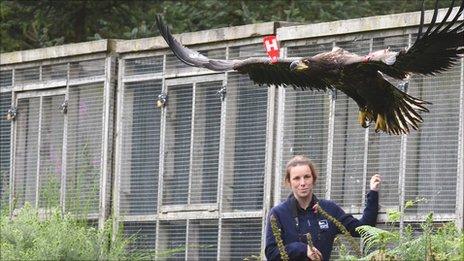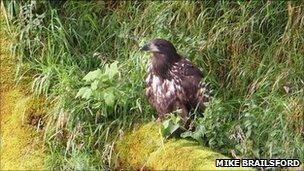Sea eagles released into the wild from Fife
- Published

With a wing span of 8ft, the white-tailed sea eagle is the UK's largest raptor
A new batch of 16 young sea eagles has been released in Fife as part of ongoing efforts to reintroduce them across Scotland.
The white-tailed sea eagles, released from a secret location, are the UK's largest bird of prey.
They were reared until they were old enough to fledge, after arriving from Norway in June.
The eagles have been raised in specially built aviaries on a diet of grey squirrel, roe deer and haddock.
The East Scotland Sea Eagle reintroduction scheme is run by RSPB Scotland, Scottish Natural Heritage (SNH) and Forestry Commission Scotland.
Chick hopes
Since the sea eagle reintroduction initiative began in 2007, a total of 80 birds have been released on the east coast of the country.
With a wing span of 8ft, the white-tailed sea eagle is the UK's largest bird of prey.
It was completely wiped out in Britain in the early 20th Century and only returned when a reintroduction programme began on the island of Rum in 1975.
Claire Smith, RSPB Scotland east Scotland sea eagle officer, said: "It's great to see these birds fit, ready and raring to try out those impressive wings for the first time.
"Each bird has been fitted with a radio and wing tags so both project staff and the public can follow their progress.

Sixteen young sea eagles were released as part of efforts to reintroduce them across Scotland
"For 2011 we've chosen red wing tags with white letters and numbers, and as usual any sightings can be reported to us via email.
"Every day our older birds are spotted in locations up and down the country and we're hopeful in the next couple of years the east of Scotland could have its first wild-bred chick."
Susan Davies, SNH policy and advice director, said: "More and more people in the east of Scotland are starting to spot these spectacular sea eagles in places like Loch Leven and throughout Fife, as well as further afield.
"This is a firm sign that the sea eagle is spreading back out into areas of its former range in Scotland.
"All of this is of course about protecting and restoring our wildlife, something that is everyone's responsibility and to all our benefit."
- Published27 June 2011